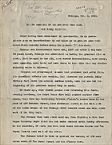| Entries |
| C |
|
Chicago Relief and Aid Society
|

|
The Relief and Aid Society was one of dozens of sources for charity in Chicago in the mid-nineteenth century; others were run by Cook County, religious groups, ethnic associations, trade unions, and women's committees. The society functioned on a relatively small scale until the Great Fire of 1871, when Mayor R. B. Mason, at the request of a delegation of prominent businessmen, designated this organization as the “official” agent for the distribution of millions of dollars of “fire relief.”
Many acclaimed the society's fire relief as a triumph of organization and system, while others bitterly complained that the suffering of many Chicagoans, particularly immigrant workers, too often was seen as beyond the pale of the society's mission. The Relief and Aid Society closed the books on their fire relief effort with $600,000 of the funds donated to the city left unspent, having come to the conclusion that all “honest need” born of the fire had been addressed. This surplus provided an operating budget that allowed the organization to build a new headquarters and suspend all new fundraising until the mid-1880s. In 1909, the society was absorbed into the United Charities of Chicago.
The Encyclopedia of Chicago © 2004 The Newberry Library. All Rights Reserved. Portions are copyrighted by other institutions and individuals. Additional information on copyright and permissions.